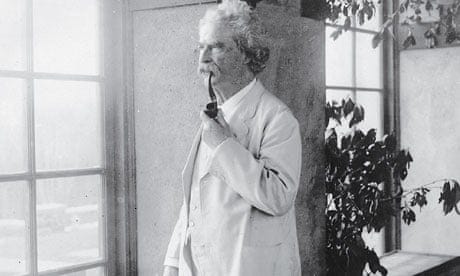Beyond the White Suit: Rediscovering the Real Mark Twain
From boyhood nostalgia to bitter regret, a deep dive into Mark Twain reveals Samuel Clemens as a man of contradictions, whose legacy is far more complex than the caricature we've come to know.
By and by, Samuel Clemens was a man of contradictions. Jubilant and tragic. Accepting and judgmental. A critic of the social classes who desperately wanted to be an industrial magnate. A cynical humorist. And a man desperate for platonic female companionship but who kept his daughters at arm’s length.
We all know the name Mark Twain. He is the symbol of 1800s-era Americana with his matching white suits, bushy mustache and hair, and his witty, humorous quips that had enough truth to soften the accompanying bite. He was full of entrepreneurial spirit, but severely lacked business sense. Still, Mark Twain was the charming, folksy humorist who knew how to tell a story, and hence became an American legend.
I’ve always been intrigued by Mark Twain. Ever since I received an abridged version of The Adventures of Tom Sawyer in a McDonald’s Happy Meal (tells you how old I am), I’ve loved the romantic story of boyhood in the 1800s before smartphones, television, and Spotify. All you needed was a can of paint and a fence, and you could sell the opportunity.
So, when famed biographer Ron Chernow released his book on Mark Twain, I almost threw my back out picking it up, but I bought it anyway. At more than 1,000 pages, I found out that Twain was more than just Tom and Huck and an occasional Connecticut Yankee. At first, he sought adventure. Then, he aspired for fame and fortune. When hit by tragedy over and over again, he tried to escape, and when that didn’t work, he felt regret over what he lost along the way.
The Twain we know today feels closer to an animatronic version Disney dreamed up for an amusement park. While we imagine him as a symbol of the South or the West, he spent much of his life in the Northeast and in Europe. As a lecturer, Twain was the first of his kind, selling out theaters with his words, his wit, and his stories. In some ways, his oratory informed his writing and vice versa.
What surprised me most about Twain through Chernow’s biography is how little I knew about him beyond his caricature, his boyhood adventures in Mississippi, that he spent time in Nevada and Northern California, and a few humorous quotes that occasionally come up.
More than half of Chernow’s biography covers the time post Huckleberry Finn. From his poor investments in a typsetting machine that didn’t work and a publishing house that thought luck was a business plan, he was constantly hustling to stave off financial ruin, despite being the most well-known American author and married to a coal heiress.
We also see the deep sorrow and tragedy that impacted his world and his worldview. He lost his only son early in life and a daughter to meningitis while he was away in Europe. Another daughter suffered from severe epilepsy, and another had several stays in hospitals dealing with mental distress. Livy, his wife and steady hand, also endured chronic illness, and when she died, he was lost.
Like any good biography, we see Twain’s triumphs and his warts. It also inspired me to delve into his writing in depth, including some of his works I had never known existed. Here’s a sampling:
His Memoirs
His memoirs Life on The Mississippi, The Innocents Abroad, and Roughing It, tell the humorous stories of his adventures. Twain collected characters, if only to help tell the story and the truths he found interesting. In each of these writings, you can find an underlying societal critique and subversion.
The Boyhood Novels
In his two most famous works, Tom Sawyer and Huck Finn, Twain romanticizes his boyhood life in Missouri. In some cases, particularly in Tom Sawyer, it’s hard to read the casual racism of the 19th-century South. Besides the obvious references to slaves, the villain, Injun Joe, is not a generous portrayal of Native Americans.
Huck Finn, which is a substantially more adult read, has more than 200 appearances of the N-word. There was one point that was repeated so often, I felt nauseous. But what’s remarkable about Huck Finn is how it portrays the growing relationship of mutual respect between Huck and Jim as humans. Ernest Hemingway said, "All modern American literature comes from one book by Mark Twain called 'Huckleberry Finn.'" Hemingway also remarked that it’s best to skip the last quarter of the third act when Tom Sawyer enters the picture. I couldn’t agree more. It’s unnecessary and unravels the masterpiece of the first two-thirds.
The English Novels
It’s hard to imagine that Twain also wrote two novels set in England. Twain wrote The Prince and the Pauper and A Connecticut Yankee in King Arthur’s Court to both celebrate our European cultural roots and to critique them.
In his travels, he was enamored by Anglo traditions, the idea of a monarchy and nobility that people of flesh and blood could have such different lives because of their status when they were born. In Prince and the Pauper, he shares a basic story of the grass isn’t necessarily greener when a royal exchanges his life of constraint and obligation for what he believes is a life of freedom and vice versa. In Connecticut Yankee, an 18th-century metal craftsman and businessperson wakes up in Camelot and tries to instill modern technology in the land of knights and wizards, only to have human nature corrupt modernity. Connecticut Yankee starts off whimsical but turns dark and I suspect he started with the idea of bringing modernity to Camelot, only to realize that maybe that was the worst idea.
Other Essays
The War Prayer. As Twain’s demeanor grew darker, he spoke against America’s imperialistic endeavors. The War Prayer is an effort to mock the idea that we must impose American ideals, particularly religious ones, across the globe through conquest and colonization. It’s a great perspective to read in these modern times.
A True Story, Repeated Word for Word As I Heard It. The legend goes that this is the story his housekeeper and former enslaved woman, Aunt Rachel, told Twain that further opened his eyes to the evil of slavery. The story is a poignant narrative about resilience, loss, and the enduring bonds of family. It is told through Aunt Rachel’s voice, in some cases using phonetical spelling to capture her true voice. In 2025, this has different resonance, but in the 1800s, it was wild that Twain gave Aunt Rachel a voice, but also shared her humanity and pain for everyone to read. I read that this conversation was one of the inspirations for how he wrote Jim in Huckleberry Finn.
Other thoughts
Mark Twain’s crutch phrase is “By and by.” He uses it a lot. So much so, you can create a drinking game. No, seriously.
His favorite point of view, and his most effective, is the first person. In his memoirs, it makes sense. In Tom Sawyer, he uses the third person, and it feels constrained. In Huck Finn, Twain is masterful in conveying Huck’s naive yet observant point of view.
Not looking to read 1039 pages of biography? Watch the four-hour Ken Burns documentary.
Side of Mustard
Speaking of Mark Twain…
“Never argue with a fool, onlookers may not be able to tell the difference.”
I wonder what Twain would say about social media and the level of debate and dialogue on the various platforms (including this one?). He may have a tweet like this, “Social media is the modern town square where everyone talks, but is too busy crafting the perfect burn, they forget to listen.” Or maybe he’d block everyone and go back to steamboats.
It happens to the best of us. Last week, I got ahead of my skis a little bit with frustration and posted this:
Boy, did I get some engagement and comments. First, I let myself get caught up in the moment and decided to be provocative. There was a part of me that took that dopamine hit and wanted to respond in kind and devolve into the fool Twain describes. But then I took a breath and looked around. Life is good. There is no reason to let these comments pull me from my compass. So, instead, I responded with questions about how my critics were doing and wishing them well. Unfortunately, they didn’t respond. I wish they would. But perhaps they weren’t looking to engage in that way.
Political discourse is important. It’s part of what makes a society great is to provide ideas, learn about contrarian ideas, and find ways to either find compromise or consensus. Winning is when it works for as many people as possible, not necessarily when a “loser” is determined.
As we continue to live in these divided times, let’s look for ways to engage that encourage humanity, or at least discourage keyboard jousting. Because if Twain taught us anything, it’s that wit wins, but kindness lasts longer.
Also thinking of Edison…
Here’s another quote that is representative of my editing process at the moment…
“I have not failed 10,000 times. I have successfully found 10,000 ways that will not work.”
Thomas Edison
Have you ever worked on a project for so long, convinced yourself that it worked, only to have a few folks come by and truthfully share how it doesn’t? They correctly point out the flaws, the missteps, and places it doesn’t work. Yep, that’s the status of my Work In Progress manuscript.
The good news is that I see my mistakes, and I accept them. I also am grateful for those who had the courage to point them out. I know what not to do now. On the other hand, rewriting is daunting. And a full rewrite is different from a first draft. A first draft is an exploration. A rewrite is course correction. But this is what I signed up for, right? Edison wanted to create electric light. I want to write a redemption story. There’s no giving up now.




Loved this! I spent my early years near Hannibal, MO, so I have been a Twain fan for as long as I can remember. Visited the house where he lived and the cave where Becky and Tom got lost. All the touristy nonsense. But there's still something about visiting the place where a great author created that feels powerful.
And let's face it, the man was both genius and normal in the best possible ways. At least, that's my take.
I really enjoyed this! I might have to listen to this biography.